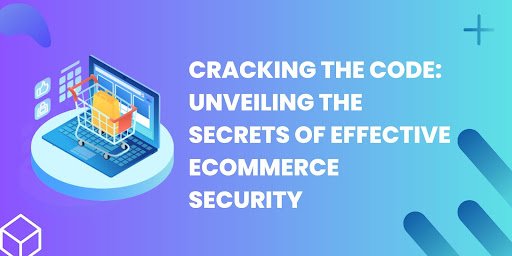Running an online business can be exciting, but it also comes with security concerns. Cybercriminals might try to steal customers’ data, causing data breaches and damaging your reputation.
Thankfully, there are solutions to safeguard your ecommerce platform and protect customer data. In this blog, we’ll explore essential solutions and tips to ensure effective ecommerce security.

Enhance Your Knowledge: How to build an eCommerce Website?
Contents
Epic eCommerce Breaches: Unforgettable Cybersecurity Incidents
Target (2013)
In December 2013, cybercriminals gained unauthorized access to Target’s network. They stole data from approximately 40 million credit and debit cards used by Target customers. The breach also exposed personal information, such as names, addresses, phone numbers, and email addresses. About 70 million customers were affected by this cyberattack.
eBay (2014)
In 2014, eBay, one of the world’s largest online marketplaces, suffered a breach. The breach impacted around 145 million user accounts. The attackers gained access to the company’s network. They obtained sensitive user information, such as names, addresses, encrypted passwords, and email addresses.
Ashley Madison (2015)
AAshley Madison, a website known for facilitating extramarital affairs, fell victim to a high-profile breach in 2015. The breach exposed sensitive information of more than 30 million users. The compromised data included usernames, email addresses, and transaction details.
Ecommerce Security Solution
Use a Secure Ecommerce Platform
Choose a trusted ecommerce platform with built-in security features, like Shopify or Magento.
Obtain SSL Certificates
Install SSL certificates to encrypt data and create secure connections between customers and your website.
Regularly Update Software and Plugins
Keep your ecommerce platform, CMS, and plugins up-to-date to fix security vulnerabilities.
Implement Strong Password Policies
Enforce strong password rules for user accounts, including a mix of letters, numbers, and special characters.
Conduct Regular Security Audits
Regularly check for weaknesses in your ecommerce system to proactively address potential threats.
Monitor and Analyze User Activity
Use a monitoring system to detect suspicious behavior and respond quickly to threats.
Secure Payment Gateways
Choose reputable payment gateways that follow security standards to protect customer financial data.
Educate Employees and Customers
Train employees on e-commerce security and educate customers about safe online shopping practices.
Must-To-Incorporate Solutions for Ecommerce Security
Two-Factor Authentication (2FA)
Two-Factor Authentication (2FA) is a boon for eCommerce security systems to protect customer accounts. It requires users to provide OTP for two platforms to access their accounts.
What does it include?
Usually, this involves entering a password (first factor) and then a unique code sent to their phone or email (second factor).
This additional step makes it harder for unauthorized individuals to access sensitive information, ensuring a safer online shopping experience.
Incident Response Plan
An Incident Response Plan (IRP) is a cybersecurity strategy. It helps handle security incidents efficiently. The plan identifies roles and responsibilities, detects issues, contains problems, and recovers systems. Afterward, the team learns from the experience and improves the plan. Regular testing keeps it up-to-date and effective.
8 Tips to Crack the Code for Ecommerce Security
- Choose a secure ecommerce platform with regular updates.
- Install SSL certificates to encrypt data.
- Keep software and plugins up-to-date for added protection.
- Enforce strong password policies for all user accounts.
- Conduct regular security audits to identify vulnerabilities.
- Monitor and analyze user activity for suspicious behavior.
- Partner with reputable payment gateways for secure transactions.
- Educate employees & customers about e-commerce security best practices.
What are the Benefits of Ensuring E Commerce Security?
Ensuring e-commerce security is important because it brings many benefits for both the online businesses and their customers. Here are some simple reasons why it’s essential:
Customer Trust
When customers feel safe while shopping online, they trust the website more and are more likely to buy things from there.
Protection of Information
Ecommerce websites handle sensitive information like credit card details and addresses. Good security keeps this information safe from hackers and thieves.
Following the Law
Many countries have rules about keeping customer data safe. By following these rules, businesses avoid getting into trouble.
Preventing Fraud
Strong security helps stop bad people from making fake purchases, protecting the business from losing money.
Good Reputation
A security breach can make people think the website is not trustworthy. Good security helps keep a good reputation.
Beating the Competition
When a website is known for being safe, people choose it over other websites that may not be as secure.
More Sales
When customers feel safe, they are more likely to buy things, which means more sales for the business.
Protection from Cyber Attacks
Good security keeps the website safe from bad people trying to break it or make it stop working.
Safe Payments
Security ensures that payment transactions are done safely and that no one can steal payment information.
People Trust the Business
Good security shows that the business cares about its customers’ safety, making people trust the business more.
Conclusion
Ensuring e-commerce security is crucial for online businesses. By implementing strong security measures and best practices, businesses can gain customer trust, protect sensitive information, and succeed in the digital market. Prioritizing e-commerce security is not only a responsibility but also an opportunity for growth and success.
